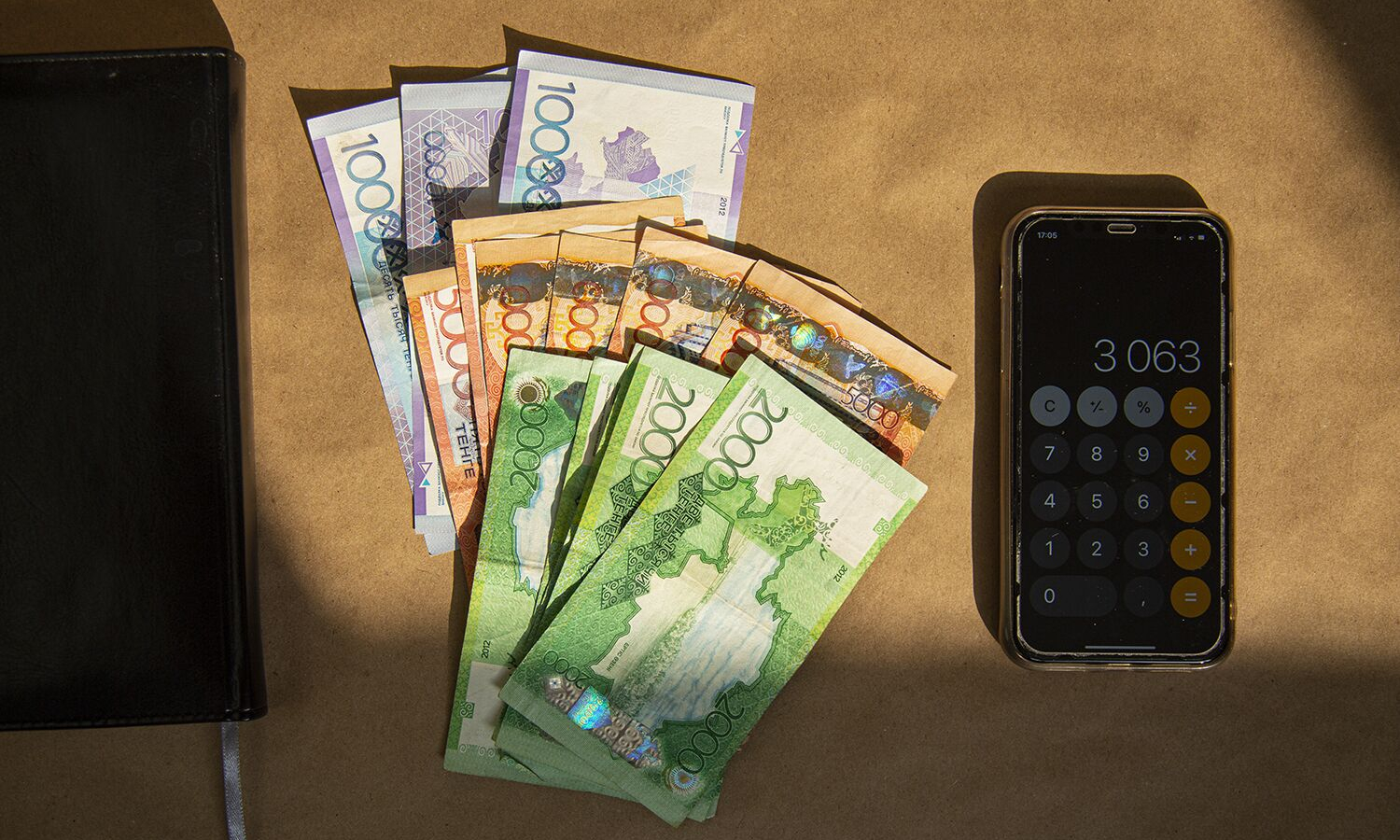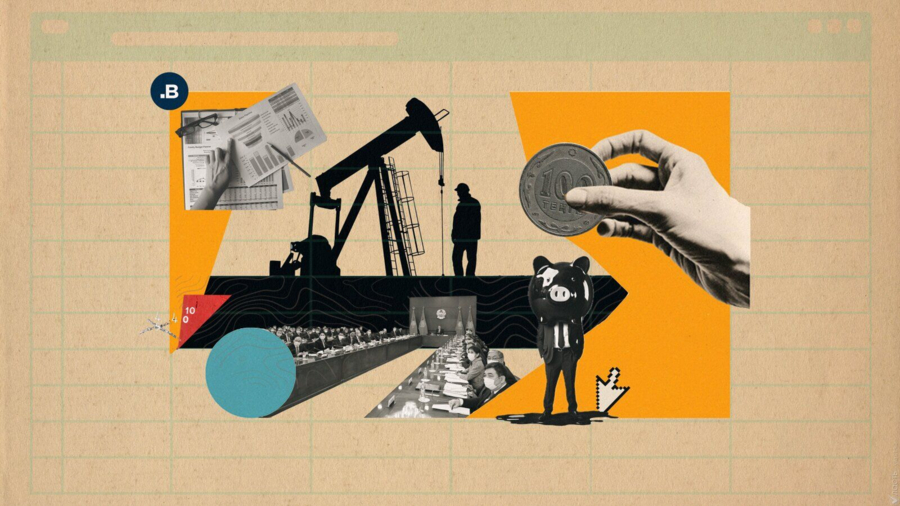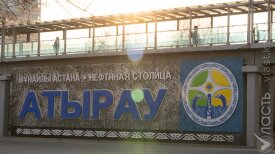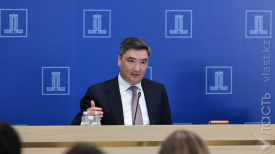- ВКонтакте
- РћРТвЂВВВВВВВВнокласснРСвЂВВВВВВВВРєРСвЂВВВВВВВВ
Читайте этот материал на русском.
As the budget deficit grew steadily in the past few years, Kazakhstan has increasingly used its National Fund to cover the growing expenses and shrinking non-oil revenues. Economists are debating strategies to get out of the crisis, from tax administration reform to higher taxes.
According to the ministry of finance, the deficit amounted to 2.2 trillion tenge ($4.5 billion) in 2023. However, according to Halyk Finance analysts, without cash injections from the National Fund, it would have stood at 11.6 trillion tenge ($24 billion).
The National Fund is thus the main instrument the government uses to cover the budget deficit. In the last three years alone, National Fund transfers have financed 20% of all government expenses.
Since tax collection rates have declined, the government is pushing for more transfers more often in an effort to support the economy, fix infrastructure, implement social programs, and service the national debt.
Economists and budget experts are debating ways to get out of the current budget hole. A cut in spending, especially social spending, is considered to be the easiest option. Yet, this could have a negative effect on the quality of social infrastructure and general wellbeing. Given the current rate of population growth, this solution could prove dangerous.
But are there ways to increase revenues instead?
The Applied Economics Research Center (AERC) suggested focusing on improving the quality of value-added tax (VAT) administration and abolishing tax breaks. This could potentially bring the budget 5-6 trillion tenge annually ($10.3-$12.3 billion).
Economists interviewed by Vlast agreed that these two measures could work as a solution to the crisis, but with a limited long-term potential.
Proposal 1: Improve Tax Administration and Reduce Benefits
Financial consultant Rassul Rysmambetov believes that improving tax administration would be an adequate response to the deficit problem. This could bring more than 2 trillion tenge ($4.1 billion) into the budget.
According to Rysmambetov, it is important to combine this measure with reducing the ability to split large businesses into smaller companies.
Rysmambetov argues that state development programs should be the driver for tax incentives.
“Kazakhstan needs to clearly define what kind of economy it wants to see in five years,” Rysmambetov told Vlast.
A complement to these measures, according to Rysmambetov, could be “increasing the state’s share in the subsoil sector,” thus making state companies more valuable. Yet, this could change the government’s policy towards the largest mining and hydrocarbons projects in the country.
Murat Temirkhanov, head of research at the private consulting firm Halyk Finance, estimates that reducing tax benefits could save the budget around 4-5 trillion tenge ($9 billion).
According to Temirkhanov, this measure should first be targeted at large companies and their investment contracts. These are often subject to tax breaks, which means that they are not large sources of revenues for the state coffers. Plus, the secrecy of these contracts means that society has no information about who gets these benefits and how much they cost the budget annually.
"Previously, all tax breaks were justified as measures to diversify the economy, bring business out of the shadows, and increase the investment attractiveness of Kazakhstan. But there has been no real progress to this effect, and non-oil budget revenues have sharply decreased because of these measures," Temirkhanov noted.
At the same time, Halyk Finance considers improving tax administration to be an ineffective measure. Kazakhstan has already done a lot to digitalize VAT and electronic invoices, so this will not result in a sharp increase in tax collection.
The only promising area is the fight against smuggling and gray imports, according to Temirkhanov. The discrepancy between official statistics records data on Chinese imports to Kazakhstan in 2023 was $9.3 billion. This is a record value over the past 20 years. As a result, the budget is losing a very large amount of VAT due to smuggling and underestimated imports.
Proposal 2: Raise Taxes
Economist Almas Chukin argues that the two measures described above would cover only 20-30% of the existing deficit: With the current tax policy, Kazakhstan will not be able to increase budget revenues proportionally to the growth of its expenses.
Chukin compared Kazakhstan, where the ratio of collected taxes to GDP is 13%, to Western countries, where tax collection is at 30% or higher.
Therefore, Chukin said that raising taxes should be a key step to overcome the crisis of public finances.
“If we do not raise rates, the country will not develop. This will hurt people more, especially socially vulnerable categories, because the budget will not be able to fulfill its role as a shock absorber of social inequality,” Chukin told Vlast.
Other experts agree with him. Temirkhanov, citing government calculations, said that increasing the VAT rate from 12% to 16% will bring the budget 2.5 trillion tenge ($5.1 billion). With the addition of a progressive income tax rate, another 1-1.5 trillion tenge ($2-3 billion) would reach the budget.
Rysmambetov also drew attention to the tax burden for subsoil users.
“Not all subsoil users pay large sums. Some pay very little. A low tax burden for subsoil users represents the state’s gratitude for their entry into our market. But now we need to look at European countries,” Rysmambetov told Vlast.
In general, European countries apply higher tax rates and provide fewer VAT rebates to extractive industry companies.
Proposal 3: Rethinking the Economic Development Model
According to economist Kuat Akizhanov, Kazakhstan should overhaul its concept of a budget deficit. He argues that it is normal to run a budget deficit in order to develop the weakest social and economic sectors.
“Look at the global practice: The US, EU, Japan, and other developed countries live with a large deficit. But they are not scared of bankruptcy, while developing countries like Kazakhstan are. We need to stop playing by such rules,” Akizhanov told Vlast.
The National Fund, created to temper the economy by removing excess windfalls from oil extraction, should be reworked, Akizhanov argued. Oil money is still being injected into the economy and this is driving up inflation, without bringing the desired effect in the form of higher taxes and improved quality of life for citizens.
It is important for Kazakhstan to reinvent the very model of economic development in order to direct the National Fund assets toward the creation of industries capable of significantly improving the lives of citizens, said Akizhanov.
Now, according to Akizhanov, the country’s development is hampered by the ruling elites’ fixation on their own enrichment. Therefore, since gaining independence, Kazakhstan's industry has been deteriorating, and the economic system has struggled to cope with crises.
This is why transfers from the National Fund have become necessary.
And the withdrawal requests often come directly from the president, who seems to manage the National Fund's funds at his own discretion and without public control.
“When necessary, the president saves a bank and then organizes a program for children. But how effective is all this? There should be restrictions. Any public funds must be under the control of citizens,” Akizhanov said.
Поддержите журналистику, которой доверяют.









